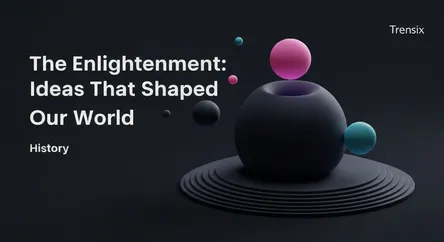History
The Enlightenment: Ideas That Shaped Our World

An overview of the Enlightenment, the 18th-century intellectual movement that championed reason and reshaped politics, science, and human rights.
What is it?
The Enlightenment was a transformative intellectual and cultural movement in Europe during the 17th and 18th centuries, also known as the Age of Reason. It championed reason and science as the primary sources of authority, shifting focus away from tradition and religious dogma. Central to Enlightenment thought were ideals such as individual liberty, equality, religious tolerance, natural rights, and constitutional government. Thinkers like John Locke, Voltaire, and Jean-Jacques Rousseau argued that governments should exist by the consent of the governed to protect citizens' natural rights. This period also promoted the separation of church and state and the application of rational principles to social and political reform.
Why is it trending?
The Enlightenment remains a vital topic because its core principles are the bedrock of modern Western political and intellectual culture. The ideals of liberty, equality, and individual rights that it promoted became foundational to many of the world's strongest democracies, directly influencing the American and French Revolutions. Today's political debates, discussions about human rights, and the struggle between democratic and authoritarian values are deeply rooted in Enlightenment philosophy. Furthermore, contemporary challenges like systemic inequality and racism prompt a critical re-examination of the movement, questioning how its universal ideals were applied in practice and highlighting its ongoing relevance.
How does it affect people?
The Enlightenment's legacy profoundly affects people today. Its principles are enshrined in the U.S. Constitution and many other legal and governmental structures worldwide. The concept of a government with a separation of powers—legislative, executive, and judicial—is a direct outcome of Enlightenment thinking. The movement's emphasis on reason and empirical evidence fueled the Scientific Revolution and continues to underpin modern scientific inquiry. Ideas like the social contract between the government and the governed are fundamental to contemporary democracy. Widespread public education and the belief in human progress are also enduring legacies of this transformative period.